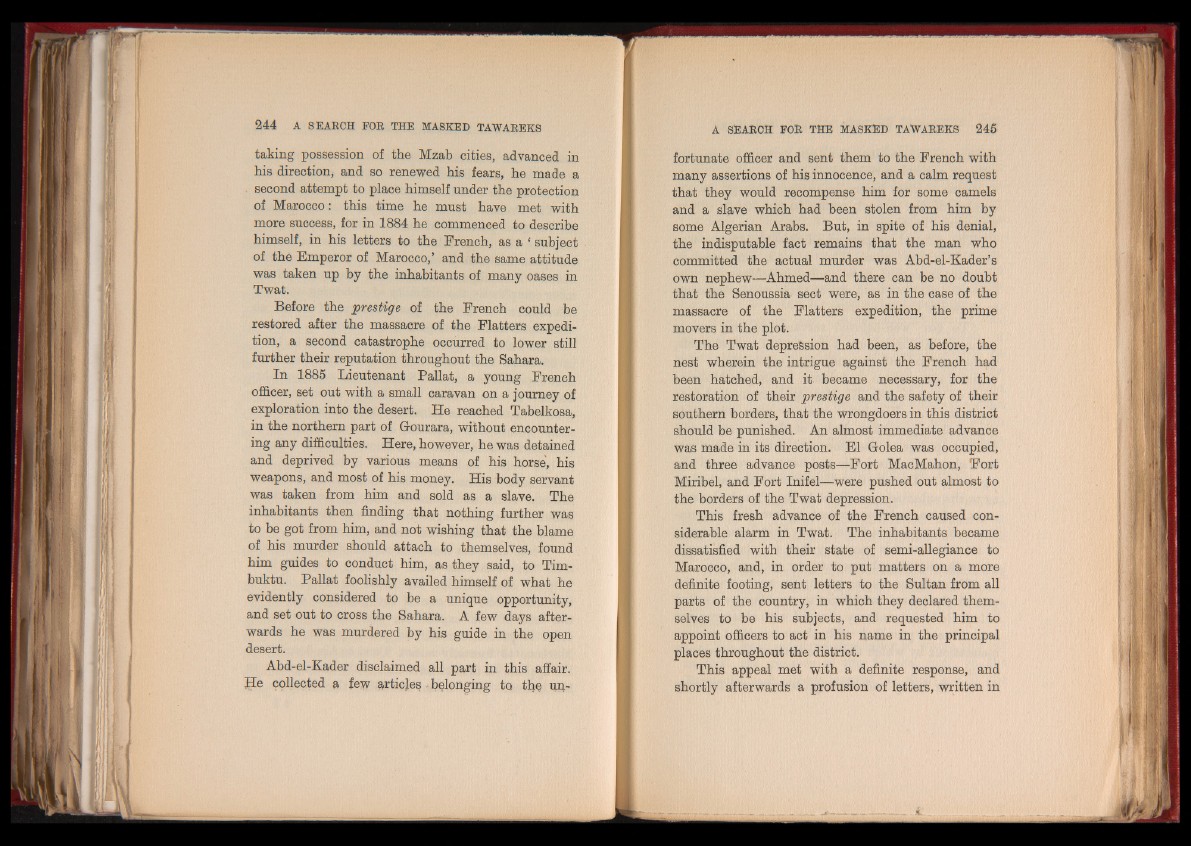
taking possession of the Mzab cities, advanced in
his direction, and so renewed his fears, he made a
second attempt to place himself under the protection
of Marocco: this time he must have met with
more success, for in 1884 he commenced to describe
himself, in his letters to the French, as a ‘ subject
of the Emperor of Marocco,’ and the same attitude
was taken up by the inhabitants of many oases in
Twat.
Before the prestige of the French could be
restored after the massacre of the Flatters expedition,
a second catastrophe occurred to lower still
further their reputation throughout the Sahara.
In 1885 Lieutenant Pallat, a young French
officer, set out with a small caravan on a journey of
exploration into the desert. He reached Tabelkosa,
in the northern part of Gourara, without encountering
any difficulties. Here, however, he was detained
and deprived by various means of his horse, his
weapons, and most of his money. His body servant
was taken from him and sold as a slave. The
inhabitants then finding that nothing further was
to be got from him, and not wishing that the blame
of his murder should attach to themselves, found
him guides to conduct him, as they said, to Timbuktu.
Pallat foolishly availed himself of what he
evidently considered to be a unique opportunity,
and set out to cross the Sahara. A few days afterwards
he was murdered by his guide in the open
desert.
Abd-el-Kader disclaimed all part in this affair.
JETe collected a few articjes - belonging to the upfortunate
officer and sent them to the French with
many assertions of his innocence, and a calm request
that they would recompense him for some camels
and a slave which had been stolen from him by
some Algerian Arabs. But, in spite of his denial,
the indisputable fact remains that the man who
committed the actual murder was Abd-el-Kader’s
own nephew—Ahmed—and there can be no doubt
that the Senoussia sect were, as in the case of the
massacre of the Flatters expedition, the prime
movers in the plot.
The Twat depression had been, as before, the
nest wherein the intrigue against the French had
been hatched, and it became necessary, for the
restoration of their prestige and the safety of their
southern borders, that the wrongdoers in this district
should be punished. An almost immediate advance
was made in its direction. El Golea was occupied,
and three advance posts—Fort MacMahon, Fort
Miribel, and Fort Inifel—were pushed out almost to
the borders of the Twat depression.
This fresh advance of the French caused considerable
alarm in Twat. The inhabitants became
dissatisfied with their state of semi-allegiance to
Marocco, and, in order to put matters on a more
definite footing, sent letters to the Sultan from all
parts of the country, in which they declared themselves
to be his subjects, and requested him to
appoint officers to act in his name in the principal
places throughout the district.
This appeal met with a definite response, and
shortly afterwards a profusion of letters, written in